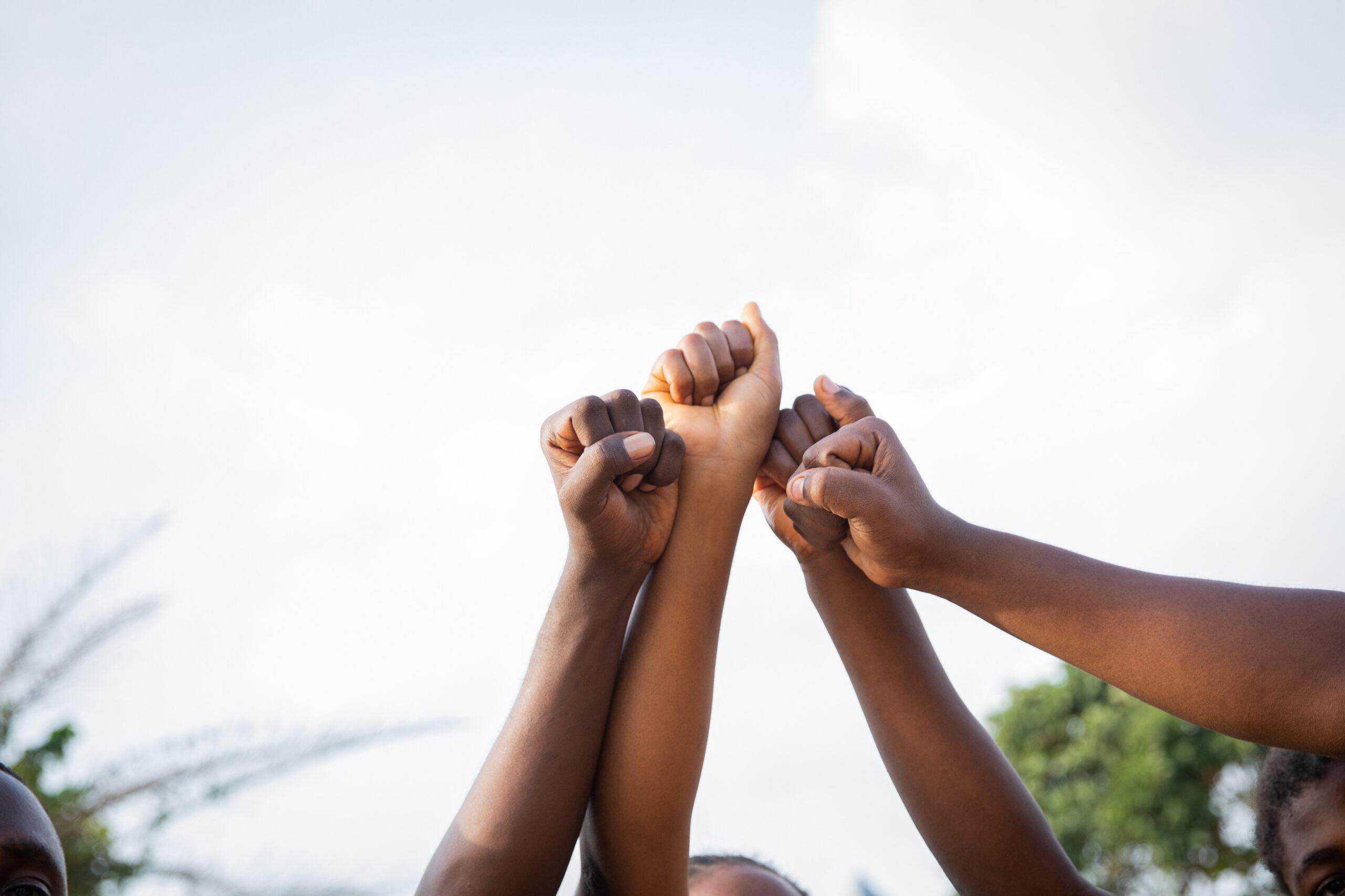Natalia Oberti Noguera is an energetic, mission-focused, and passionate speaker who pushes ideas and boundaries while simultaneously inviting you into spaces you otherwise might not know, in order to help you more deeply appreciate how valuing each other’s differences can make us all stronger, accepting, and yes, wealthier.
We had a chance to sit down with Natalia, the founder of Pipeline Angels, a company that is changing the face of angel investing by literally changing the face of angel investing (i.e. less white dudes, more women, non-binary people and men of color). Since launching in 2011, Pipeline Angels has had over 300 members who have gone through their signature investment boot camp, investing over 5 million dollars in over 50 portfolio companies.
[EDIT NOTE: Pipeline Angels is now recruiting for new potential investors! If you ever thought about becoming an angel investor now is your chance. Learn more and apply before September 21, 2018.]
Her Agenda: Why don’t you tell us a little bit about yourself, your background and what led you into entrepreneurship?
Natalia Oberti Noguera: I’d like to say that I started Pipeline Angels through reverse market research. In 2008, I had the opportunity to build a network of women entrepreneurs in New York City. I grew the group from 6 women to over 1,200. They all were women social entrepreneurs looking to do good. What I realized – and this is when I had my “aha” moment – is that society has a gendered perception on how we view the world. When a woman or femme says, they want to change the world, the assumption is that they are going to start a nonprofit. When a guy says, he is going to change the world, people are not assuming he is going to launch a nonprofit.
I realized that there are a lot of high-net-worth women and femmes who are making a lot of impact with their money through philanthropy, charity, and donations. I wanted to create a bridge from philanthropy into angel investing. I wanted to share with them that they could make a positive impact with their money by investing in women-led, femme-led, for-profit social ventures.
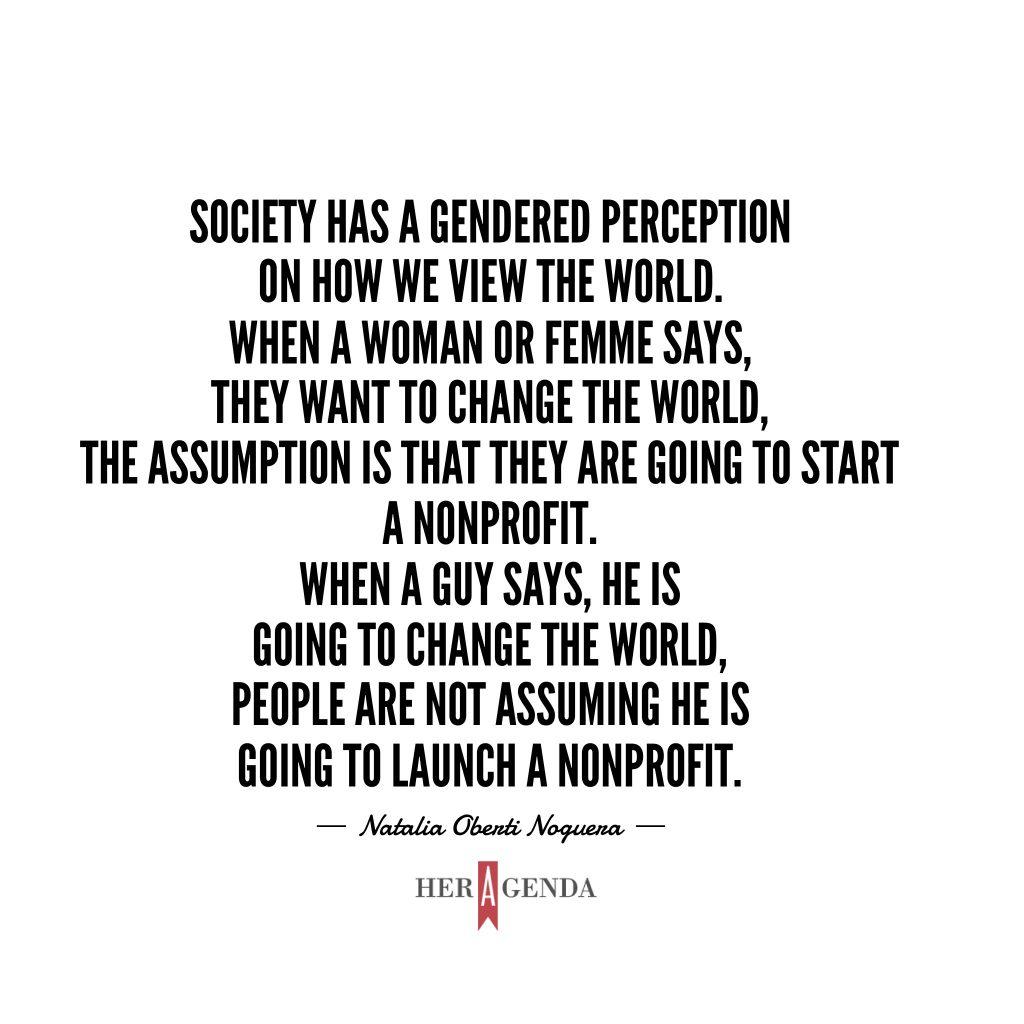
Her Agenda: Did you have any sort of background in venture capitalism before you moved into building a company around it?
Natalia Oberti Noguera: This is why I’m being cheeky and saying I founded it through reverse market research. A lot of activity in the entrepreneurship [world is] about supporting entrepreneurs. I didn’t see a lot of activity on the investing side in terms of supporting investors. That’s why I focused there.
Her Agenda: Tell us a little more about Pipeline Angels.
Natalia Oberti Noguera: As you probably know from our website, Pipeline Angels is changing the face of angel investing – literally. We’re creating capital for women and non-binary femme social entrepreneurs. Anyone identifying with womanhood, cis, trans, third gender, is encouraged to apply. Identifying with womanhood does not mean the same thing as identifying as a woman. That’s why we use language like, our women and femme members, and our women and femme-led portfolio companies.
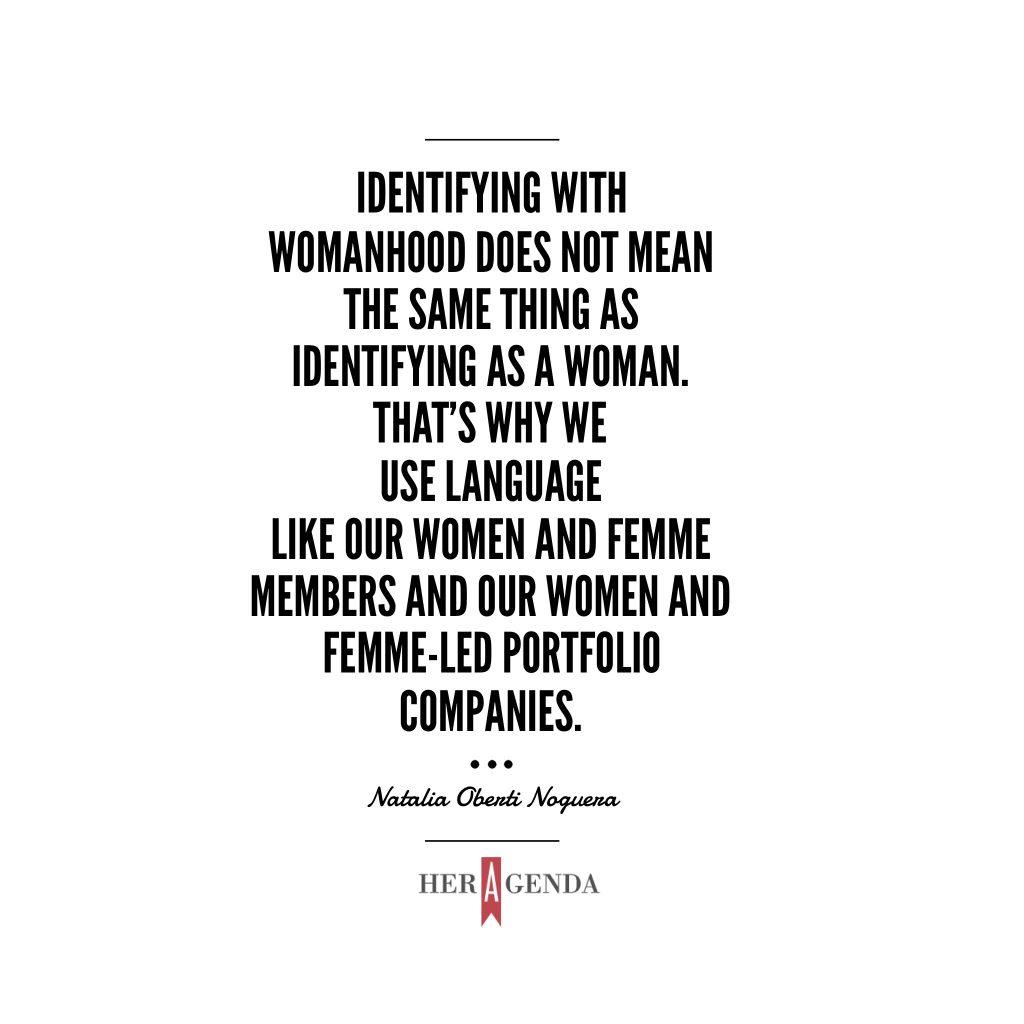
If anyone has watched Shark Tank, I like to call our members ‘sharks in training.’ For most of them, it’s their first time making an angel investment. By the end of the program, they have earned their wings because they have made their first angel investment.
Another important point for me is that only .2% of venture capital is going to Black women founders. Of the 50 plus portfolio companies in Pipeline Angels, over 20 percent have a Black woman founder. That’s something I’m just very proud of.
Not sure if you came across the Vanity Fair article that talked about the 26 women founders who had raised over a million dollars? I feel like it was the epitome of bittersweet, because I should keep turning the pages and there should be more, and more, and more in that club. Sweet because at least we’re helping to amplify and grow that number. Three of those companies (featured in the article) are Pipeline Angels portfolio companies. I like to say that our members are the friends and family round for entrepreneurs who don’t have that early, early critical support. I know we have about three to four, if not five Pipeline Angels portfolio companies that are about to join that club. So, I’m really excited about that as well.
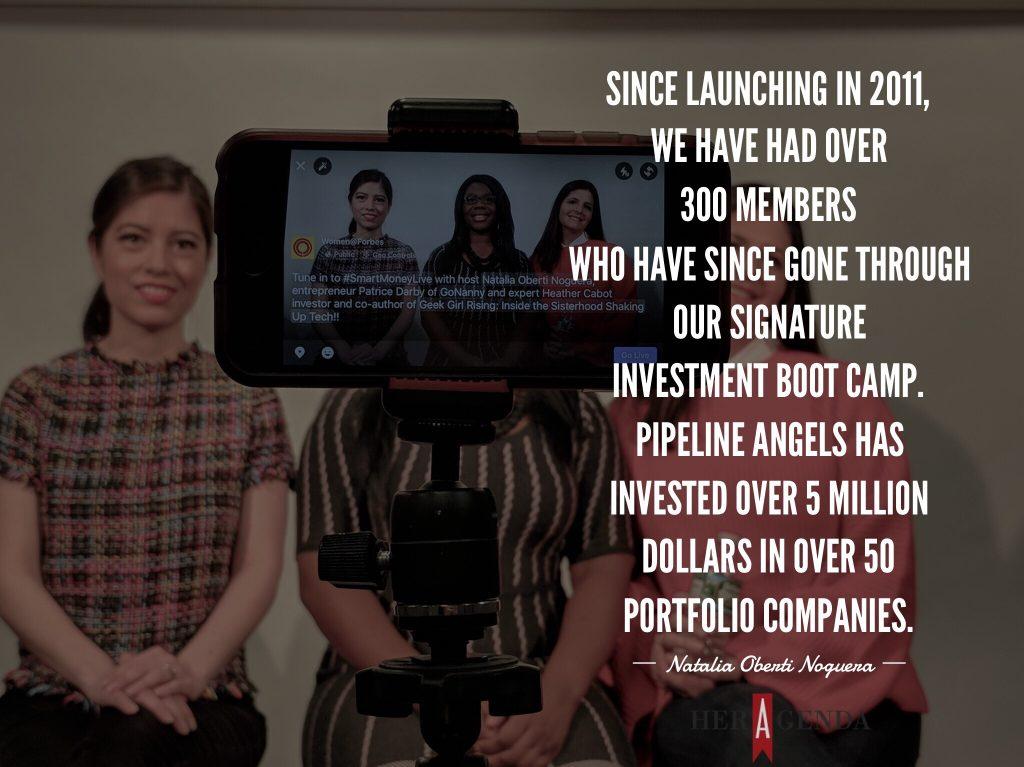
Her Agenda: What’s one question you wished someone would ask you?
Natalia Oberti Noguera: What’s interesting is often times with founders, we get asked, why do you start? I think it’s just as important that we get asked and that we answer, why do we stay? Of my two stay stories, the first one happened in 2012. A very well-known white guy investor was interviewed at a tech conference, and he was asked, what do you look for when you invest? And he very simply, nonchalantly said, someone like me. This is before pattern recognition and pattern matching became super trendy words. Now, there are phenomenal organizations out there, including Her Agenda, that are making the obvious specific business case for diversity. I was actually interested in turning (the concept of pattern recognition) on its head and saying, well, if we invest in what looks like us, if we invest in what’s familiar, let’s get more of us on the investment side because we’ll probably be more open about investing in more of us on the startup side.
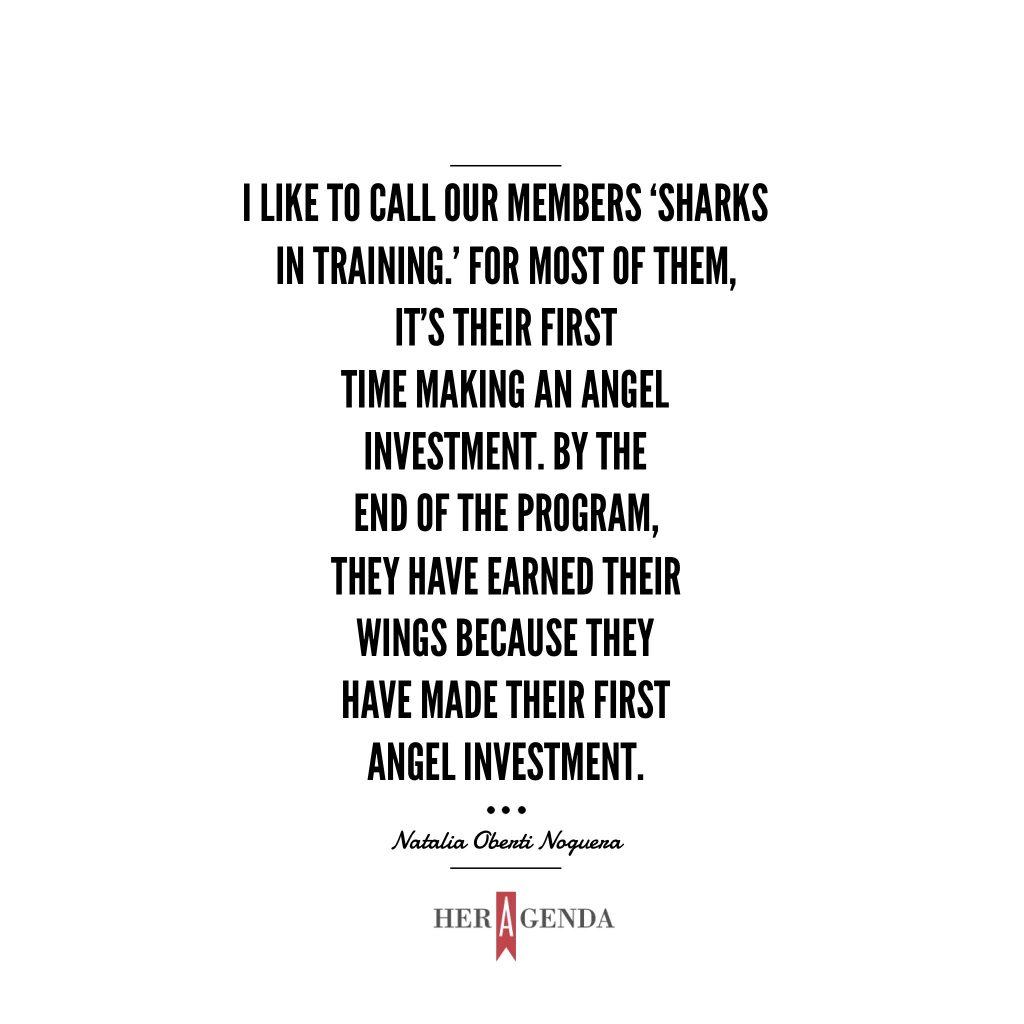
The other kind of moment that happened, was when I was invited as an observer to a meeting that an angel group had. Twenty-two people were in that room. Two of them were women – including me. Two of them were people of color, including me. That means there were – 19 white guys, one Black guy, one white woman, and me. They were going around the table deciding whether they wanted to invest in a specific startup. It’s going to get very heteronormative so please, I’ve warned you – they were like, well my girlfriend and her friends think we should do this. Well, my wife and her friends think that we should do this. It became very obvious to me that the networks and the skill sets and knowledge of all these women were in the room. The only thing that was missing from the room was the women themselves. I remember being excited because I was like, this is the data point of why Pipeline Angels needs to exist. This is what proves we are on the right path. I also remember clearly thinking that if I hadn’t been working on Pipeline Angels, I would’ve been so frustrated and angry at this meeting. Instead, this experience underscored the need for Pipeline Angels.
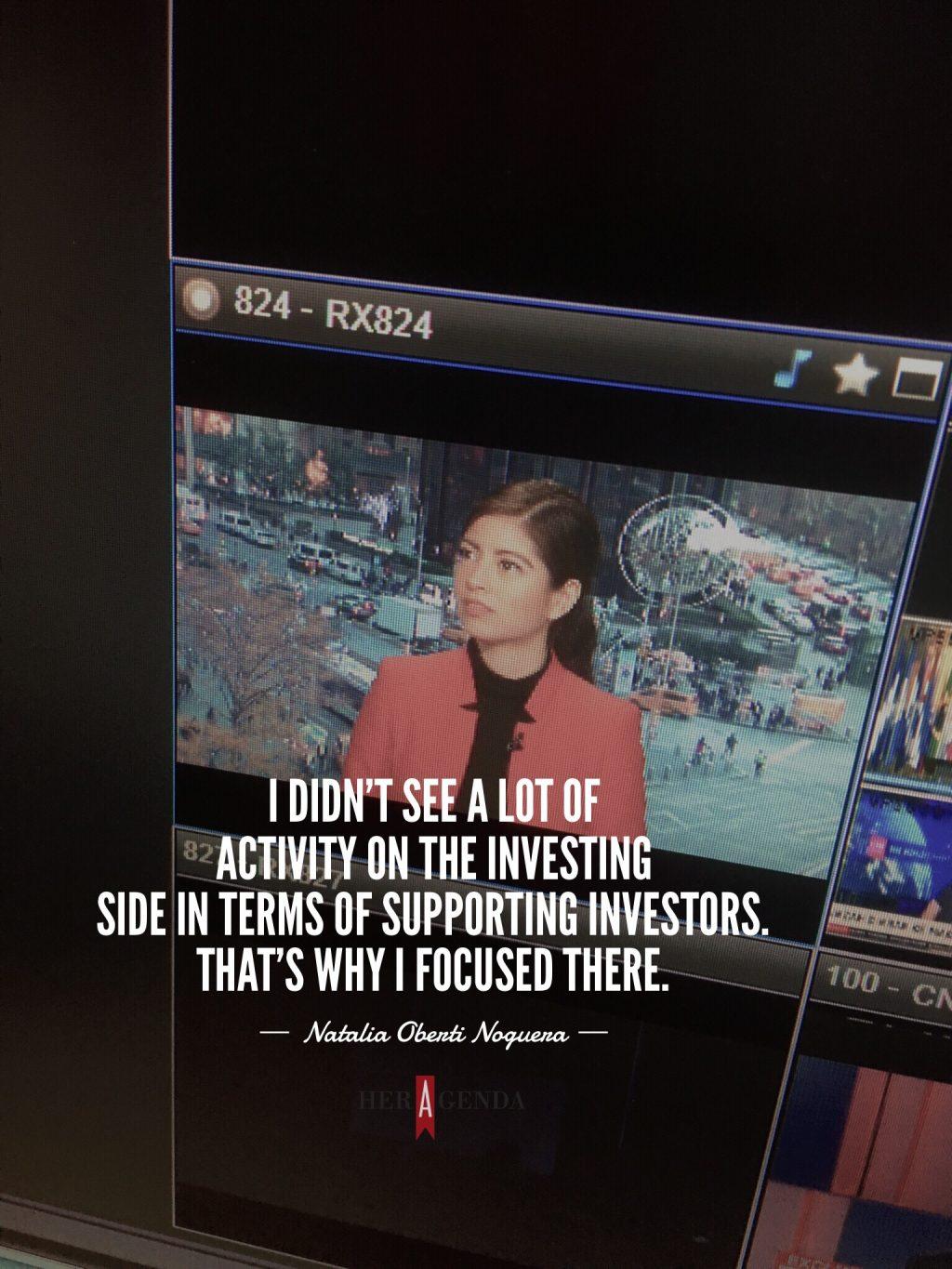
Her Agenda: How does the face of Pipeline Angels differ from traditional angel investors and VC’s who are out there?
Natalia Oberti Noguera: In 2013 – it was one of those years – I remember I wrote an open letter on BlogHer about Where Are The Women Of Color Sharks? There hadn’t been any women of color or femmes of color sharks on the show. So, once again diversity meant white women and men of color. The solution for entrepreneurship is not solely white women investing in more white women. We need to make sure that we have a more diverse and inclusive response and that we are not perpetuating systems that we are aiming to disrupt.
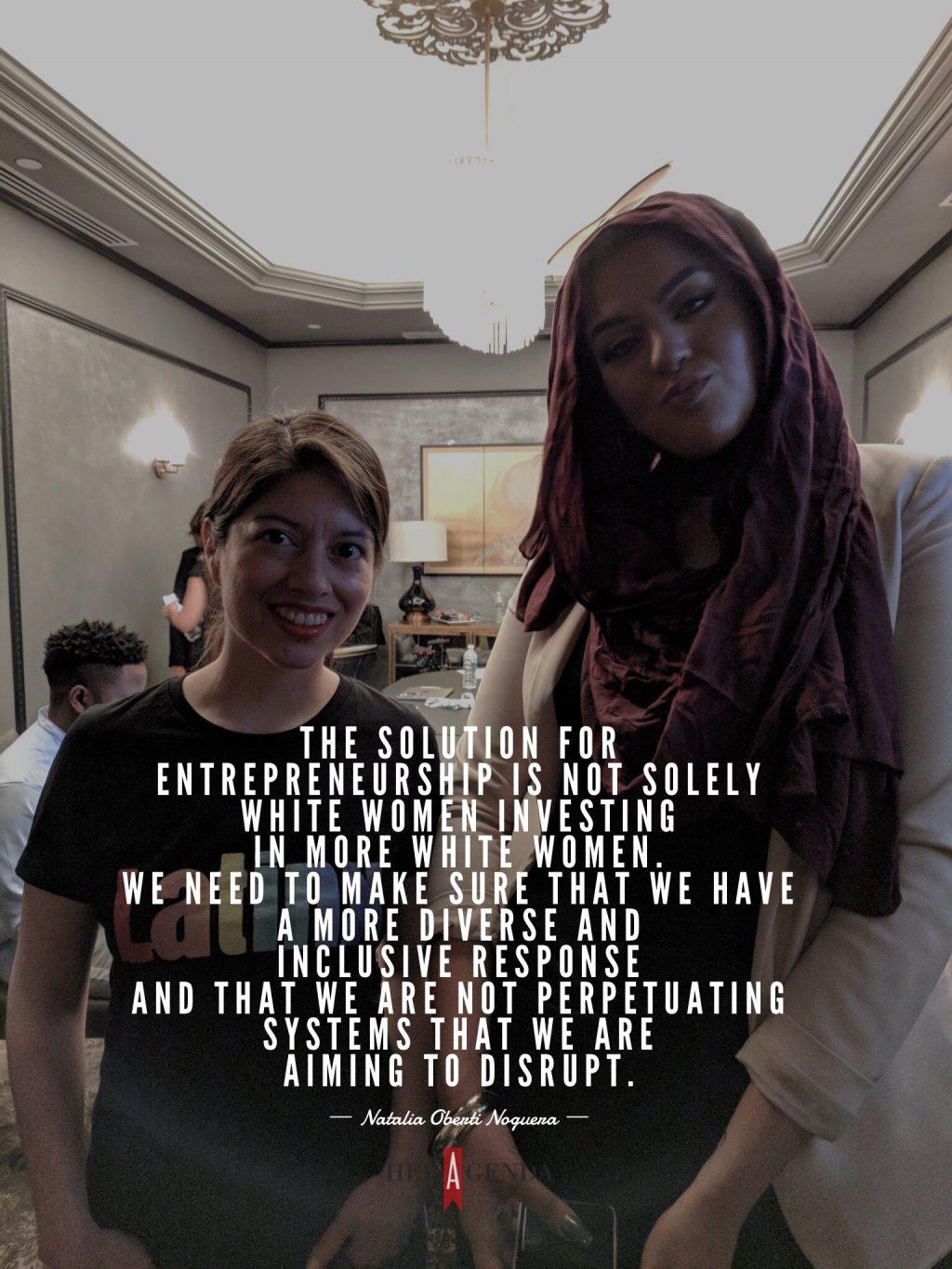
Her Agenda: What is the biggest difference between the education and the background you are giving the Pipeline Angels versus what you see in the typical VC world?
Natalia Oberti Noguera: I’ll answer this in two different ways. There are two different sorts of profiles of people who are attracted to Pipeline Angels. The first are people who maybe do watch Shark Tank, maybe do know about angel investing, maybe have gone to some meetings of their local angel group, and these groups tend to be predominantly white or male, so they don’t necessarily feel welcomed there. It doesn’t feel friendly. The investment focus of those angel groups isn’t something that necessarily resonates with them. What attracts them to Pipeline Angels is the fact that it is a sisterhood – remember “sis” not “cis” – and the fact that the focus is investing in women-led, femme-led, for-profit social ventures. Doing good, doing well – that’s what resonates with them.
The second profile, which I think is super interesting as well, is someone who has maybe never read about or knows that angel investing is a word that exists. What they are is very active in their community. They volunteer, they do philanthropy and community service.
One of my favorite definitions of angel investing is that its smart money. What I mean by that is that it’s not just a financial investment, it’s also the human capital and social capital that our members can provide. Human capital in terms of skillsets, expertise etcetera. And then social capital in terms of connections and networks. What I sometimes tease and say for the second profile of potential members is they are already doing two out of the three. That’s called volunteering. That’s called community service. We’re encouraging them to step up to the plate and write those checks and become angel investors. What resonates with them is supporting in women and femme founders, as well as the focus on social entrepreneurship looking to do good.
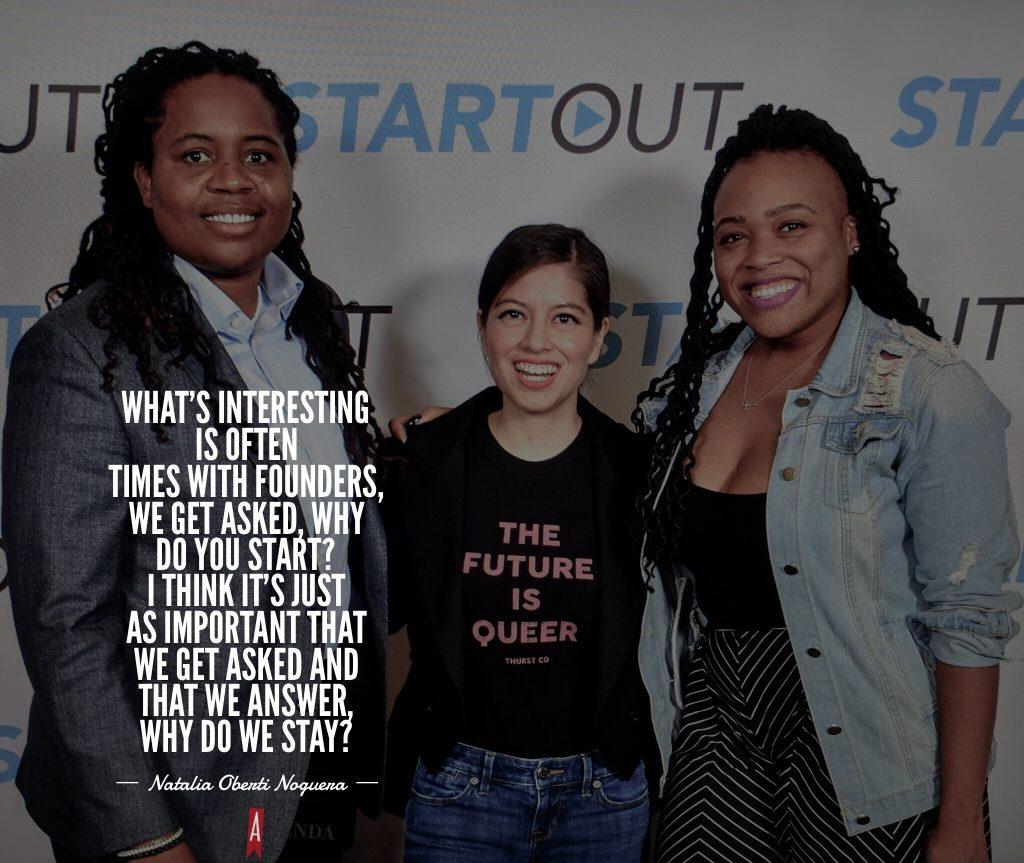
Her Agenda: I think you and I know why that diversity in angel investing and entrepreneurship is important. But for women who are not in the entrepreneurial space, they probably don’t know that Black women are the largest group of women entrepreneurs that are emerging and that Latina women are right there behind them. Would you be able to give our audience a little bit of background into the diversity that already exists in this space and why that exists?
Natalia Oberti Noguera: I will be very provocative, so I hope you’re sitting. Number one – I don’t like [the word] Latina women. Either say Latinas or Latinx (when referring beyond women). That’s just my preference – please keep in mind. Number two, why are these demographics the fastest growing? It’s because a lot of these people (Black women and femmes, as well as a lot of Latinas and Latinx femmes) are getting pushed out. If they aren’t being pushed out of the corporate world, they are hitting up against… well, it’s not even a glass ceiling. It’s a concrete ceiling. It’s white concrete, a white concrete ceiling.
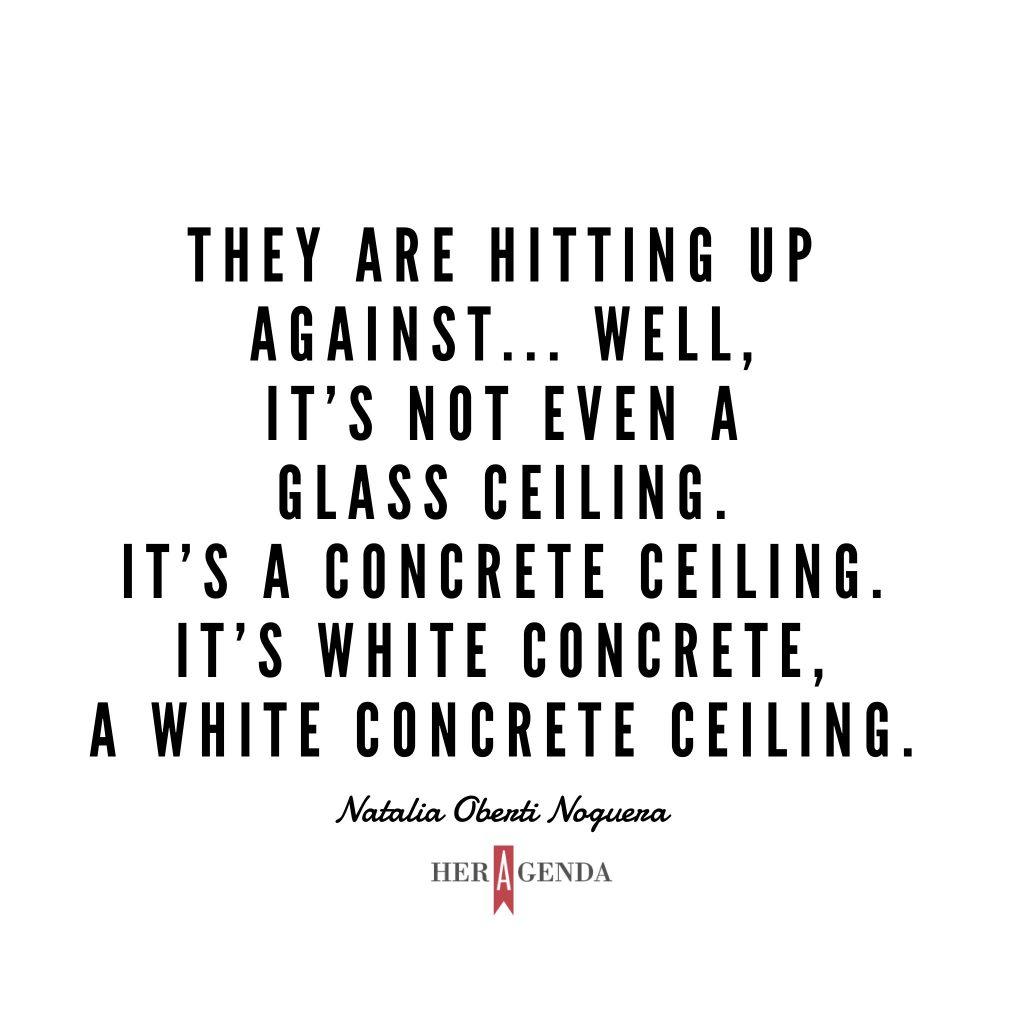
If it were a meritocracy, where women of color and femmes of color could (equitably) climb the ladder, that’s fantastic. However, because it’s not a meritocracy, it’s almost like there’s all this effort and little reward. Yes, it’s super hard to be an entrepreneur, it’s super hard to be a founder. At the same time, there’s the realization that being one’s own boss gives a huge sense of liberation and agency that one doesn’t always find out there in the corporate world.
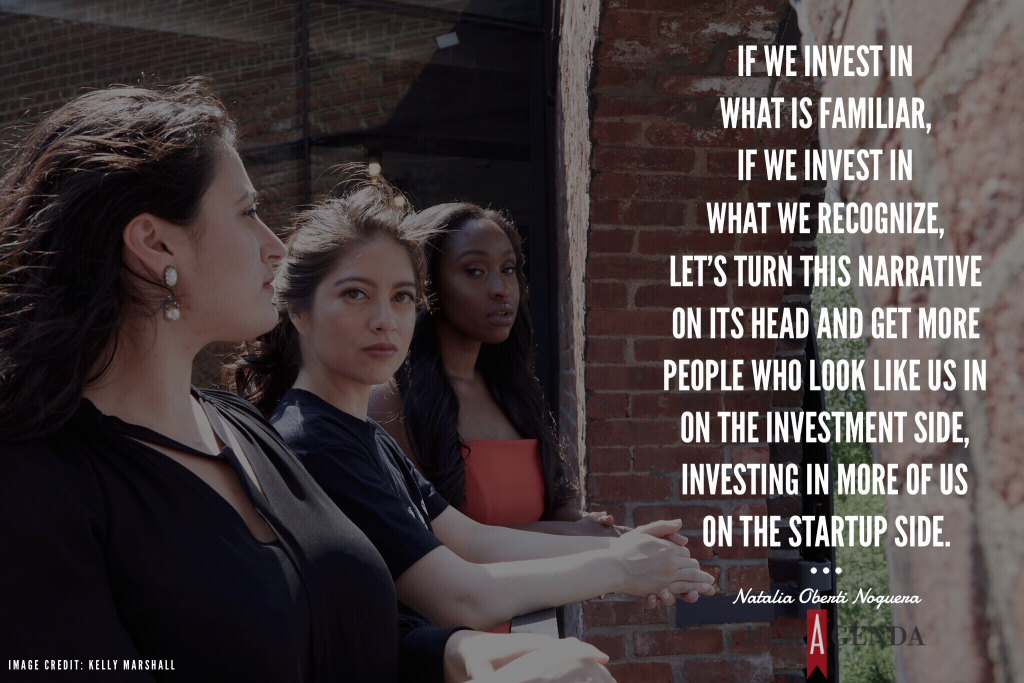
Her Agenda: How are your members adding value to these women and femmes?
Natalia Oberti Noguera: We talk about how our (Pipeline Angels) members are the friends and family round for entrepreneurs who don’t have a friend and family round. I started paraphrasing Rihanna because, if we want more of us to shine bright like a diamond, we need to invest in diamonds in the rough.
A good example of that is a Pipeline Angels (portfolio) company called Blendoor. Their tagline is analytics and AI to outsmart unconscious bias. Their founder is Stephanie Lampkin, a queer Black woman who went to MIT and Stanford, who studied and majored in computer science. When she was out there searching for a job, she was told she was not “tech enough.”. That’s actually what inspired her to launch Blendoor. Last year, she was on the cover of The Atlantic. She won Google Demo Day. Our members invested in her over two years ago. So, it took two years for the status quo to realize the potential that our members noticed over two years ago
That’s the key. That’s where I believe our members are adding value because we need to create the runway to give these companies a chance to be seen by the status quo. While I believe in the importance of creating new systems, the reality is that there is so much money stuck in the status quo. For a lot of companies to succeed, we need to find a way to unleash money from the status quo. To do that, we need to create this runway to provide these companies with a chance. That’s what we are doing.
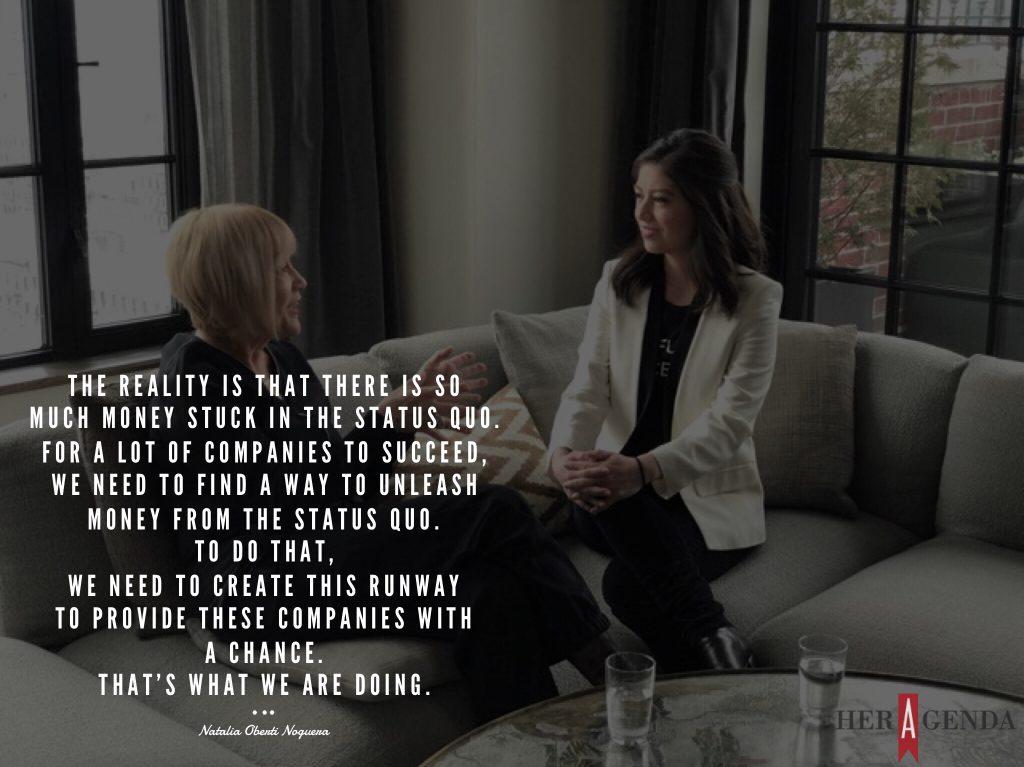
Her Agenda: I have one more question for you. Your work is on the business side and also on the social impact side. Obviously, from a current events perspective, there’s a lot that’s happening politically right now. How do you balance it? Obviously, it can be exhausting with the current president that we are under. Do you have any advice for women who are out there, trying to do the same? Women [and] femmes?
Natalia Oberti Noguera: I really do view [Pipeline Angels as] people signing up to learn about angel investing, and then, surprise! We are teaching you about diversity and inclusion and we are teaching you about how to do better and how we can create – it’s not just a safe space, it’s a brave space. To think of such a beautiful concept. It’s [a concept] by Micky ScottBey Jones. She has this beautiful invocation-slash-poem. Brave Space is the idea that “safe space” is the wrong term. Because there’s never going to be this idea of “safe space.” That doesn’t exist. She says, together we will create brave space, because there is no such thing as a “safe space.” We exist in the real world. We all carry scars and we have all caused wounds. In this space we seek to turn down the volume of the outside world. We amplify voices that fight to be heard elsewhere. We call each other to more truth and love. We have the right to start somewhere and continue to grow. We have the responsibility to examine what we think we know. We will not be perfect. This space will not be perfect. It will not always be what we wish it to be. But it will be our brave space together and we will work on it side by side.
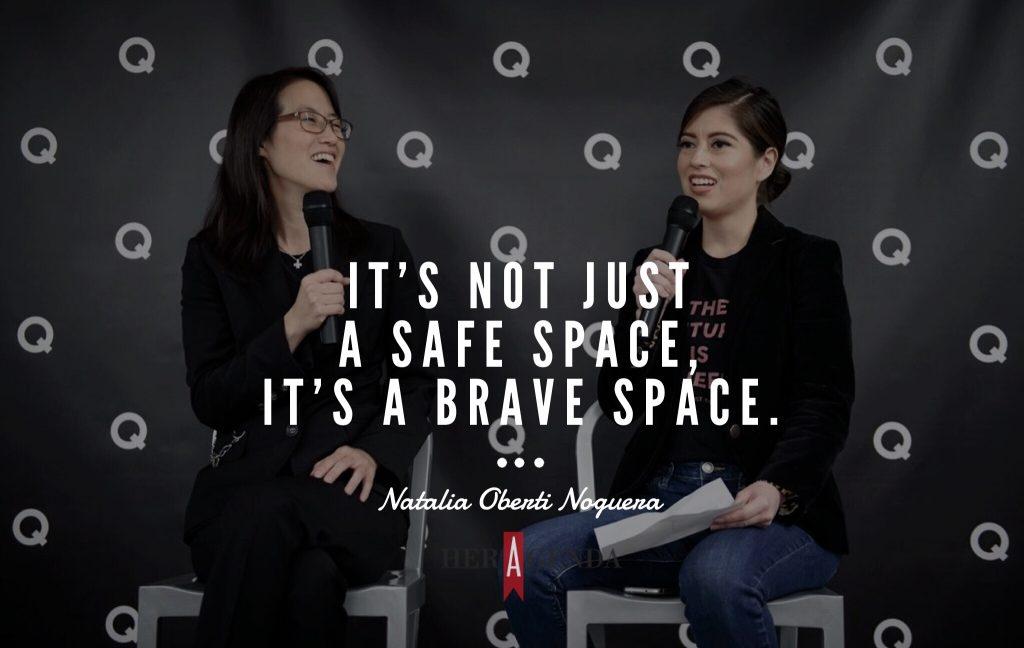
Her Agenda: Is there anything we haven’t covered or maybe have only touched on lightly that you’d like to revisit?
Natalia Oberti Noguera: Yes! I have one! I have a secret hope! I’ll share it with you. We are launching our first ever summer pilot. Sometimes we have some potential members who want to participate but due to their schedules in fall or spring, it can be hard. Guess what? Summer tends to be slower. So, we are providing a more condensed version for the summer, and we are holding the educational component –that’s when we bring everyone together before they all go to their own cities (in San Juan, Puerto Rico). That’s actually something else I (forgot) to share with you I’m super passionate about – activating local capital for entrepreneurs. Not all entrepreneurs are willing or able to go to Silicon Valley. If there’s untapped local capital, why should they? We’re about unleashing that local capital. In addition to holding the education component in San Juan, we’re also planning to launch a local cohort there. The goal is that we are going to bring money to the island, mobilize (more capital), and support the local economy. My secret hope, however – though I’m shouting it off the mountaintops – is that these new members who are signing up for this who aren’t based in Puerto Rico might come a few days earlier or leave a few days later, and they may come with friends and family. That will bring even more money to the island.
[Editor’s note: This interview was published on June 18th, 2018. It has been edited for length and clarity.]




